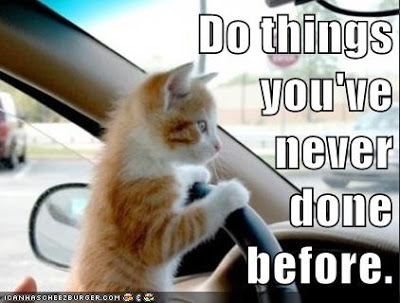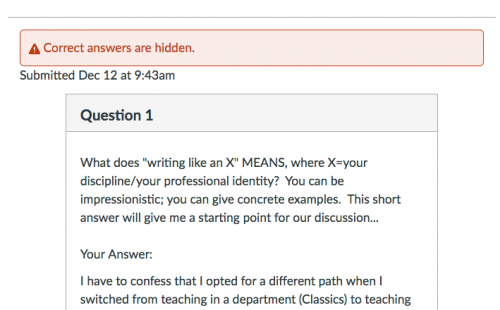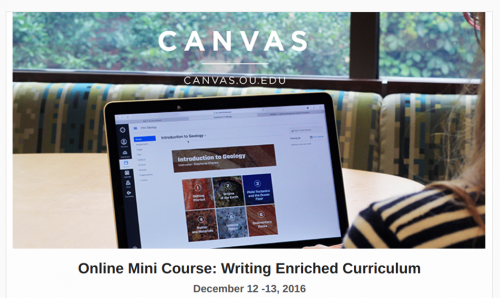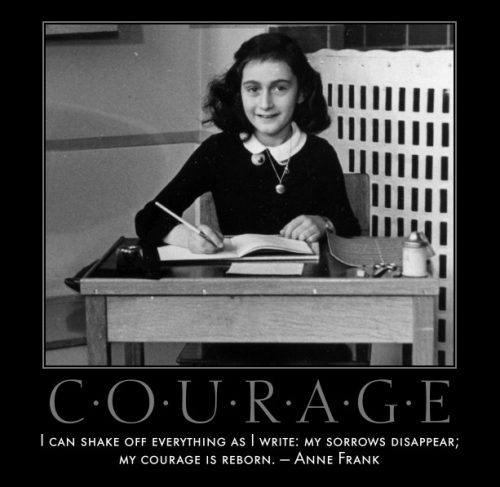I’m starting Day Two of the Writing-Enhanced-Curriculum (WEC) minicourse, and we begin with a table listing the metadisciplines and metagenres of academic writing: problem-solving, empiritical inquiry, source-based research, and performance (process and/or product-directed). I guess my students’ writing is in that last category: “engage in field-specific processes that ultimately produce artifacts.” Although I’m not sure, because the two examples given are critique and review… not creative writing.
So, I will find out on the next page whether creative writing figures in this scheme at all… but the next page is a survey/quiz. Please remain on hold while I complete the survey/quiz.
Here’s what I wrote in response to the request that I locate my students’ writing on the chart:
My students do creative writing, retelling traditional myths and legends in new ways (sometimes VERY new ways). I’m dismayed but not surprised at the total absence of the word “creative” from the chart. I guess my students are doing “performance” writing, but nothing to do with critique or review. I did one year of teaching traditional academic writing (writing ABOUT the myths), and gave it up when I could tell that either I or my students or all of us were going to die from the sheer boredom of it. But MAKING myths works great, even for students who are otherwise very reluctant writers. That’s been my experience anyway. So I preach the gospel of creativity, and even the students who declare “I am not a creative person” in Week 1 soon realize just how wrong they were. We don’t write about stories; we DO stories. 🙂
I like the dramatic use of the next page. It features a question, and only a question, asking us to answer that question before moving on to the next page: How important is it for you that undergraduates to learn to write “within the conventions” of your discipline?
I had to laugh because that single dramatic question posed right there on the page reminds me of Arlo Guthrie’s immortal words (see also below): There on the other side, in the middle of the other side, away from everything else on the other side, in parentheses, capital letters, quotated, read the following words: “KID, HAVE YOU REHABILITATED YOURSELF?”
And at last, here it is: creative writing. It shows up as item 3 on this new list of kinds of university writing: 3) Alternative / creative / personal / experimental writing.
The next page is a long extract from John Bean’s Engaging Ideas (new to me). We’re given a list of 5 different ways to work on a controversial topic (therapeutic touch) in the context of a nursing course where the writing is supposed to address the “critical thinking, inquiry, analysis, and problem-solving required of nurses.” This is very different from the kind of courses I teach (Gen. Ed. without any specific pre-professional context), so I’m going to quickly write out my reactions to each of these options, partly based on my beliefs about teaching writing (very strong beliefs) but also just trying to sort through my thoughts on discipline-specific writing (not very clear thoughts given basically no experience):
1. 8-10 page research paper. This might be an occasion for critical thinking, inquiry, and analysis, but I doubt it. Plus: BOREDOM. Danger danger danger.
2. Role-play a nurse writing a letter to the hospital board. Again, this is teetering on the precipice of boredom, but at least it is anchored in real-world practices and problems so that the research would have a problem-solving angle.
3. Literature review for a grant proposal. See comments on #1. It would be better to at least think about what the research study might entail; just doing the literature review and nothing more than that seems dangerously boring.
4. Critical review of empirical studies. This just sounds like option #1 but with a more specific slant. It also sounds fatally boring.
5. This final option is an “exploratory” research paper with a “reflective narrative” where the research is conceived as personal thought process: “your goal is not to take a stand on this issue, but to report on your process of wrestling with it.” Obviously this is the one that is least formulaic, impersonal, boring, etc. Totally do-able, open-ended, and potentially interesting.
And now, pause for another quiz/survey. It asks for a response to the nursing options, plus a response from my own discipline. I type my first paragraph:
Options 1-4 seem potentially boring and even fatally boring, although each could be improved to become less boring with some tinkering. Option 5 shows the results of tinkering so that the assignment is more personal and open-ended, less abstract and formulaic. I’m guessing students would find it stimulating to write and the instructor would find it stimulating to read. Although I’d advocate for using that framework while letting students CHOOSE a controversial topic that they are actually interested in. Is there any reason to focus on therapeutic touch only? My guess is that the class would benefit from students researching lots of topics of this type, and then sharing what they learn. The instructor could come up with a list of many such topics no doubt, and the students would then do the reflective narrative on the topic they are most motivated to learn more about. The class would benefit from a diversity of content, and the instructor would also be far less bored reading the collective results.
But just a few words into the second paragraph, Canvas timed me out so I did not get to finish my answer (I got distracted and left the quiz window open). It gave me all of 10 seconds warning: what is someone supposed to do in those fatal 10 seconds I wonder? Ugh. I’ve taught online for a gazillion years but the ways of the LMS remain a mystery to me. Here’s the other paragraph I was going to write:
Since I am not teaching within a discipline, I will instead write a pitch for why creative writing would be a meaningful and important option in a nursing course. It would not be a substitute, obviously, for the “critical thinking, inquiry, analysis, and problem-solving required of nurses,” but instead a supplement to it, one that would cultivate the practice of role-playing and empathy. Many of my students are future health-care professionals and I actually make it a point to emphasize the importance of creative insight and empathy in the medical field as, for example, in this video: Empathy: The Human Connection to Patient Care. If a faculty member felt uncomfortable with the idea of having their students do actual fiction-writing, then I would advocate for including interviews as one of the genres practiced in the course. In the reflective writing project from the nursing example, there is a mention of “talking with classmates,” but I would build in a component of actually interviewing someone: patients, family members, nurses, doctors, administrators, etc., and finding ways to elicit their experiences and reflect on them through the process of an interview.
Ahhhhhhh… on the last page, I have found my niche: Informal / Creative Assignment Ideas. And my course is actually ALL low-stakes. But lots and lots of low-stakes assignment. Why? Because practice is the only way people are going to learn to write. Lots of practice. Lots of feedback — from me, from other students, from the self-feedback that is naturally a part of revision.
Less judging. NO GRADING.
The final discussion is open-ended, so I will now go compose a response. 🙂
And, just because I can, here’s Alice’s Restaurant. A wild and crazy English teacher introduced me to Arlo in eighth grade, and my life has never been the same.
Plus, there must be a cat! I made a new one yesterday, and here it is:
Do things you’ve never done before.
That’s a good thought as the New Year is about to be upon us.
Crossposted at OU Canvas Community.





